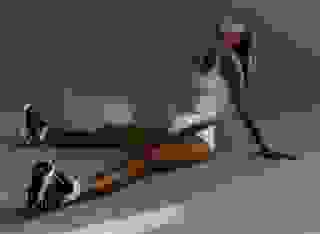Note: You can change font size, font face, and turn on dark mode by clicking the "A" icon tab in the Story Info Box.
You can temporarily switch back to a Classic Literotica® experience during our ongoing public Beta testing. Please consider leaving feedback on issues you experience or suggest improvements.
Click hereEach day I sent a group with carts to collect wood from the woodland on my estate. Most had been cut and stacked several years before for building works. Some had been used for the new lean-tos. Some was used to create beds inside the Monks' infirmary just in case another village decided to join us. There wouldn't be room inside the defences for everyone to sleep comfortably at first, but if an army came, they could retreat inside the defences until we assessed the situation.
If we had to, we could build more lean-tos to house additional people but we would be crowded for a few days until they were ready. The ground floor of the infirmary had been stabling in recent years. The upper floor had stored hay but now had beds, with straw mattresses for about one hundred people, if needed. There was a useful well on the ground floor.
I had all the trees within two hundred yards of our defences cut down. The wood wouldn't be much use for building, or even firewood until it had dried. It was stacked between the outer defences and the Roman walls. It is possible any attacker could use that wood to make scaling ladders but they had to get past the cannon, the outer defences, the musketeers and the crossbow women first, so I thought that was a risk worth taking.
That evening Helen and I were standing on the parapet of the Roman walls, hand in hand, looking at the sunset when a man came running from the bulwark into the church. We already knew that some troops were coming. I had sentries, mounted on horseback, at a mile from the fort in all directions. They would tell any farmworkers out in the fields and some had started streaming in. The bell started sounding which was the signal for an armed force approaching. Helen and I peered into the dusk but at first we couldn't see anything.
Three horsemen, one carrying a standard, slowly emerged from the trees followed by about thirty more, some obviously wounded.
"That's my father's standard!" Helen exclaimed.
"Perhaps you should go with the herald to greet him," I suggested.
Helen ran off in a most unladylike fashion. Soon I saw her, on horseback, beside the mounted herald and two outriders. They stopped about fifty yards short of the cavalry, but Helen dismounted and ran to her father. He pulled her up onto his horse and the two rode forward to talk to the herald. The herald turned back. I went to the outer entrance to meet him.
"Lord Henry?" The herald said. "Sir George says he is no threat to you. He wants to treat his wounded and rest. He intended to go to his daughter's house but understands there is nothing there."
"Thank you. Please go back to Sir George, invite him to join me, and offer the Monks' Infirmary for his men."
"You're sure? They are Parliamentary troops."
"And Sir George will be my father-in-law soon. I can't refuse help to a relative."
Helen took Sir George inside the mansion to treat several sword cuts. She arranged for several women and two elderly men, retired soldiers who had dealt with battlefield wounds, to look after the injured cavalrymen.
The wounded, and the just tired, were recovering well during the next week, warm, dry, in clean bedding and given small beer, ample food, and their wounds dressed with clean bandages.
Helen's care for them was as effective as her running of the whole fortification. She dressed Sir George's wounds which were superficial but messy. He joined us for dinner and went to bed early, tired out.
When he had gone, Helen hugged and kissed me, the most demonstrative she had been since we became engaged. From that time onwards, Helen was more demonstrative than she had been. I was frustrated because I wanted Helen as my wife, not just a fiancée.
"Thank you, Henry, for looking after my father and his men."
We did more than that. The horses were stabled on the ground floor of the infirmary. Our blacksmith, farrier and leather workers together with the uninjured cavalrymen, looked after the horses and their equipment. When they finally left the cavalry unit would be in a better shape than they had been since the start of the war.
+++
Over the months I had gradually turned the miners, farmworkers, and other younger men into a formal militia. They were now wearing buff coats with half armour and helmets. On their shoulders were badges stating 'Lord Westbury's Militia'. I had appointed three Ensigns, a dozen sergeants and three dozen corporals.
Each morning after breakfast we assembled a management group of me, the Dutch gunner captain, the three Ensigns and Helen. Since Sir George had arrived, we included him too. His information about the progress of the war was invaluable to assessing the risk to us -- apparently none at present. We were in a Royalist area but any Royalist troops locally raised were with the King's army. Although the Parliamentary army might attack some towns and cities, the danger to us in a remote rural area, was minimal.
I had assigned an Ensign to Helen to work with her on looking after the troops. Since Sir George's arrival, he had added one of his sergeants.
Two weeks later, Sir George decided he had enough fit men to resume his activities as a cavalry unit. He would head towards London to meet up with Parliamentary forces and take orders from then. Three of his men were still too wounded to continue and would probably be unfit until after the end of the war, whenever that was. We brought them into the mansion because it was pointless to use the Monks' infirmary just for three men.
Four of my Militia decided to ride with Sir George and become Parliamentary cavalrymen.
I was still slightly concerned that I was asking Helen to do so much when she wasn't my wife. Her duties and mine usually meant that dinner time, surrounded by others, was the only time in a day we spent together.
+++
Two months later we learned that the Parliamentary and Royalist forces were fighting around King's Lynn and there were riots in Norwich -- too close for comfort.
We increased the number of sentries on duty at any one time just in case part of one of the armies came our way.
The horsemen and the sentries reported another cavalry unit approaching. Cavalry, no matter how many, were a no threat to us. They couldn't cross the outer moats and in face of our firepower couldn't dismount and attack as infantry. The only people a risk might have been the farmworkers working outside but they had enough warning to get inside our defences even if that meant abandoning their work immediately. Only an army with siege cannon might trouble us.
The cavalry had two standards -- the Royalist one and the other I thought I recognised but wasn't sure. I sent our Herald out to meet them. He was back in a quarter of an hour.
"Lord Henry, they are a Royalist cavalry unit with several wounded. But their commander is your cousin, Sir Thomas."
"Helen? Please get the monks' infirmary ready for them."
"But they are Royalists, Henry. Won't that compromise you?"
"Sir Thomas is a relation. As I couldn't refuse your father, I can't refuse my cousin."
An hour later Sir Thomas's troops were being fed, their horses cared for and Sir Thomas joined us for the evening meal. He wasn't wounded but a third of his men had wounds, now being cleaned and dressed.
"Henry, thank you for what you are doing. I knew, from a captured Parliamentarian that you had looked after Sir George and his men. I had hoped you would do them same for your cousin but your people are doing far more than I had expected. But you're not a Royalist?"
"No, Thomas, I am neither a Royalist nor a Parliamentarian. I just want to protect my people whoever wins. I have fortified my estate to prevent either side from attacking me."
"And I can see that you have formidable defences. In such a remote location no one is likely to challenge you."
"Unless they want my heavy guns. They would suffer before they could break in, and I would destroy the big guns if that was likely."
"It would be a major undertaking, worse perhaps than trying to capture a walled city."
"I just want to deter an attack."
Two weeks later Sir Thomas and his men left, also better equipped than they had been when they arrived. A few days later a messenger arrived bringing a letter from Olivier Cromwell, thanking me and my people for looking after Sir George and his wounded men. He added that his army had no intention of attacking or threatening us but that after the war we could be an embarrassment. I wasn't sure what 'an embarrassment' meant.
But it was great to know that we were safe from one side at least.
Helen was acting as the Lady of the Manor and I wanted to marry her sooner than the end of the Civil war because no one knew how long that would last.
Over the next year we had to treat wounded Parliamentary and Royalist troops in the Monks' infirmary. Because they were outside our defences, they were no threat to us. Effectively we had become a hospital treating anyone who was wounded, if they could get to our remote location.
We were surprised when one family, pulling a hand cart, arrived from Norwich. Their house had been badly damaged when gunpowder exploded during the riots in Norwich. As they had walked the long distance from Norwich they had been upset by how many churches had been attacked by iconoclasts, notionally supporters of Parliament, who had smashed statues and broken stained glass in most if the churches.
They brought two letters from the Royalist Mayor of Norwich, one to me, and one to Helen who was one of his distant relatives.
The letter to me asked me to look after the family. The husband, Alexander Mercer, had been an Alderman who had wanted Norwich to be neutral. Now he was reviled by both sides. The damage to his house had been accidental, not deliberate, but he no longer felt safe in Norwich. The Mayor also told me that hostilities had temporarily ceased. Both sides were regrouping and trying to find more allies but the Major was sure the war would start again soon because the issues dividing the two sides hadn't been settled.
His letter to Helen thanked her, and by association me, for treating injured troops from both sides. Although he knew Helen favoured the Parliamentary side, she (and I) had treated injured soldiers equally. Senior commanders on both sides had been pleased with us. The Mayor thought that we would be safe until the war was over, but afterwards? The winner might attack us....
At couple of days after the arrival of Mr Mercer and family our sentries saw six horsemen approaching. They flew Sir Thomas' standard. The herald went out to meet them. He came back to report while the six horsemen remained where they were.
"Lord Henry? It is your cousin Sir Thomas and five royalist commanders. They have come here to meet a French ship to take them to France."
I asked Helen's advice.
"I think we should let them go to France, Henry. The war is paused at present. We wouldn't actually be helping the Royalist cause by letting some of their commanders leave England."
"Thank you, Helen. That's what I thought too. Herald? Tell them that they are welcome."
At dinner that evening Helen and I learned more about the war than we had known before. The Royalist commanders were sure hostilities would start again soon and the Royalist cause would probably lose, but they personally would fight until the end. They hoped to get assistance from France or elsewhere in Europe but were not optimistic.
An aside worried me. There was a possibility that war between England and the Dutch might occur again, over navigation rights for trade. They hoped it wouldn't happen until after the Civil War had finished but the Dutch might take advantage of our distraction internally.
The following morning I spoke to the Dutch gunnery captain. He too had heard the rumours and was worried that he and his men might have divided loyalties if war started. But he didn't expect it for some years. Almost all of the Royal Navy, except some minor small units, had declared for the Parliament. The British navy was still intact, battle-ready, and prepared for anything but the Dutch weren't yet.
Over the past few months, some of my militia had become competent gunners, so much so that two thirds of the Dutch had returned home. He also had some other good news. The alderman, Alexander Mercer, had previously been a gun captain, with more experience than the Dutch captain. If the Dutch left, Mr Mercer, and the trained militia gunners, should be able to handle the guns effectively. He would like more gunners to be trained but Mr Mercer could do that.
A Dutch ship was due within the week, bringing demi-cannon. The demi-cannon fired a heavier ball than the saker but had a shorter range. Two dozen were to be installed on the walls between the arrowhead bastions.
They would make a formidable addition to our defences
If I and Mr Mercer agreed, the remaining Dutch gunners and their captain would leave on the Dutch ship.
I spoke to Mr Mercer. He agreed to be the gun captain because we didn't intend to fight anyone if we could avoid it. He wanted twenty more militia men to replace the Dutchmen, when the militia men had been trained, but with what he had, he could use the cannon on three sides at once, but possibly not the fourth -- yet.
The French ship arrived to take the Royalists away. Three hours later the Dutch ship came and unloaded the demi-cannon. It took almost all of the militia to manhandle them to their place on the walls. As when the previous Dutch gunners left, they paraded on the quayside before boarding the ship. I gave each gunner a bonus of ten guineas and fifty guineas for their captain. My militia cheered them as they boarded.
The next day, training with the demi-cannon commenced. It seemed that we had some calibre of gun firing every day as the gunners practised.
A week later Sir George arrived with five other horsemen. He was just paying a visit to Helen while hostilities were paused. He was impressed, as before, with our Cannon Royal.
"Lord Henry? Those Cannon Royal might be your undoing. The whole Parliamentary army has only one. It is a nuisance because it requires sixty horses to move it and can only travel five miles a day. When it is sited, virtually no defence can stand up to it. You have ten Cannon Royal and a harbour so they could be moved by ship. Whoever wins would covet your Cannon Royal, your sakers and now you have demi-cannon as well. That is heavier gunnery than either army has and just to keep you and your people safe?"
"That's what they are for, and so far, the threat of them appears to have worked."
I took Sir George on another tour of our defences. We had improved the outer works with stone brought from a quarry a couple of miles upstream using a flat bottomed inland barge. No seagoing ship could get past our harbour. The estuary water was too shallow. Between the star bastions we had added protected musketry firing positon with roofs. Any musketeers, or crossbow women, could shoot while being protected by stone in front and above, and for the muskets, protected from the rain so their powder wouldn't get wet.
"Your fort is better built and more formidable than anything either army has built or faced, possibly because the defences for others have had to be constructed while under fire. I think you could repulse the entire army of either side, Lord Henry."
"That wasn't my intention when I started, Sir George. I just wanted to protect against a part of each army, but the Dutch engineers did their best. For them it was almost a practical exercise -- how defensible could they make it with virtually unlimited resources and time. I did want some defences before the war started. We had some, but nothing as good as it is now."
"I haven't seen any Dutchmen, Lord Henry."
"No. There is a rumour that the Dutch could attack England. Although it is still only a rumour, they felt that if war did come, they could have divided loyalties between me, their employer, and their country, so they left with my thanks. My militia gunners are nearly, but not quite, as competent as the Dutch had been. A couple of months more? They will be. Even now we could defend three sides at once. Later? All four. We hope we have time before the war restarts."
"I think you will. I expect at least another twelve months before the fighting starts again. It will and next time I think the Royalists will lose. King Charles interferes with his commanders too much and reduces their effectiveness. They are still formidable opponents but our reorganised New Model Army is now as professional as any army in the world whereas the Royalists are still the same - poorly led and less well trained."
"Will the war will restart, Sir George?"
He nodded.
"Helen didn't want to marry me until the war ended. I'm worried that could be several years and I'd like to marry her now you are here."
"I'd be willing. Whether Helen will be? That you'll have to ask her. But that could make your neutrality suspect. She and I are dedicated Parliamentarians. Married to Helen? People will assume you are too."
"Even married to Helen, I would want to stay neutral behind my walls, and still treat wounded Roundhead sand Cavaliers the same. We have half a dozen of both at present. I am surprised that they are getting on so well together but I suppose for them, they are temporarily out of the war, which is paused anyway."
"Maybe. But all the wounded you treat in the old infirmary which is outside your defences."
"We can't run the risk of having soldiers, even if wounded, inside the defences. Internal fighting is my worst fear. It is unlikely because my militia are defending their families, but having injured soldiers, from either side inside our defences, could be a risk. We have half a dozen but they are too injured even to leave their beds and are grateful for the treatment they are getting."
+++
That evening after dinner, I took Helen aside and explained that I was worried the war might go on for years. While there was now a temporary truce, and her father was here, would she marry me -- now?"
Like her father, Helen was concerned that marrying her, a known Parliamentarian, could comprise my neutrality.
"I don't think so, Helen. You are effectively the Lady of the Manor and my partner. Whether we marry of not, that won't change much. We'll still defend ourselves against anyone and treat any wounded soldiers who come here."
It took me some time to persuade Helen but she too was frustrated that as fiancé and fiancée we couldn't be as intimate as we wanted to be. Even when married? Would we have time for each other? Perhaps at night, in bed.
Two days later, we married and Sir George gave his daughter away. Our first night in bed as husband and wife was an anti-climax. We were just too tired after arranging the marriage round everything else we had to do that day. We just slept with Helen hugging my back. That was pleasant. The following night we had deliberately left as much as we could to our deputies and managed one coupling before sleep. It took several days of determined shedding of our work to others before we could achieve hours of lovemaking.
While the truce lasted we reduced the numbers of our militia manning the guns to a minimum and concentrated on organising our internal arrangements and producing as much food from our fields as we could. We had moved stored people's possessions to the extensive cellars, now free of gunpowder since that was all in specially constructed underground chambers linked by tunnels to the bastions.
Eventually we got news that hostilities had started again. We resumed our horse sentry patrols and the number of men ready to man the guns.
One day we were surprised when a small Royal Navy ship entered our harbour. As the ship had approached we had loaded and manned the guns defending the harbour until we were sure that the ship was no threat to us. It had suffered damage in an unseasonal storm and needed repairs. We were able to assist the sailors to make a jury rig. They left about three days later to go to London for more permanent repairs.








